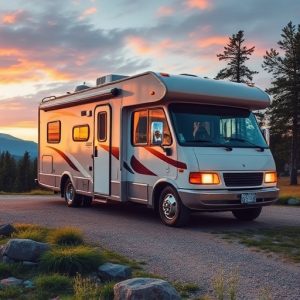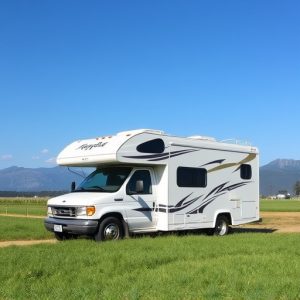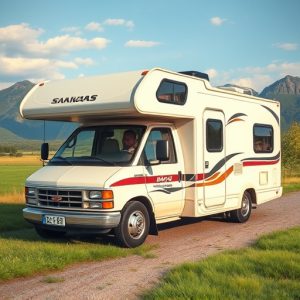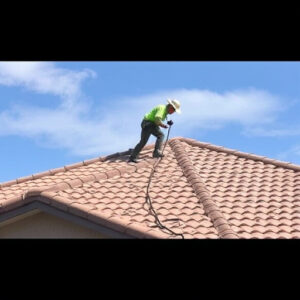DIY RV Maintenance Guide: Keeping Your Home on Wheels Safe and Road-Ready
RV travel requires diligent maintenance of various systems including plumbing, electrical, propane, …….
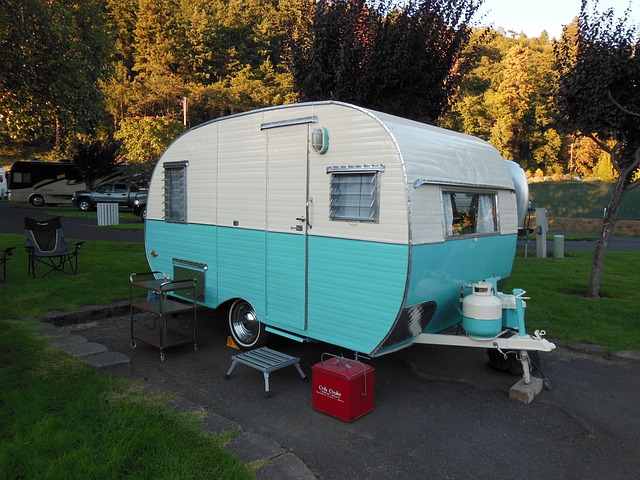
RV travel requires diligent maintenance of various systems including plumbing, electrical, propane, climate control, tires, and electrical systems to ensure safety, comfort, and efficiency on the road. Regular inspections and proactive upkeep are crucial for the RV's structural integrity, such as checking the roof, slides, and holding tanks, and addressing any wear or damage to rubber seals and caulk. Interior systems like plumbing, propane, electrical, and cooling must be regularly tested to ensure all appliances function properly, with special attention given to maintaining engine components for gas or diesel chassis. Tire safety is paramount, involving tire inspections, pressure checks, rotations, and possibly the use of a TPMS. In cold conditions, protecting the water system from freezing is essential, achieved through insulation, heat tape, trickle faucets, bypassing the water heater tank, and regular leak checks. The electrical system demands frequent cord inspections, voltage testing, fuse and circuit breaker replacements, grounding of appliances, and adherence to manufacturer guidelines for energy efficiency and battery maintenance. Seasonal winterization and de-winterization are necessary to protect the RV's plumbing and overall condition from winter's harsh effects, ensuring a smooth transition back into travel-ready mode as warmer weather returns. Adhering to RV travel tips encompasses all these practices to guarantee a safe and pleasant traveling experience.
Embarking on RV travel adventures requires diligent upkeep to ensure smooth journeys. This article outlines pivotal DIY maintenance tips tailored for RV enthusiasts. From grasping the fundamentals of your RV’s systems to the nuances of tire care and seasonal preparation, each section—covering essential components, regular inspections, tire safety, water system management, and electrical systems—provides practical guidance to keep your RV in peak condition. Stay informed and road-ready with these indispensable RV travel tips.
- Understanding Your RV's Systems: A Primer on Essential Components
- Regular Inspections and Maintenance: Keeping Your RV Road-Ready
- Tire Care and Safety: Ensuring Smooth Travel
- Water System Management: Preventing Freeze-ups and Leaks
- Electrical Systems: Safeguarding Your Power Sources
- Seasonal Considerations for RV Maintenance: Winterizing and De-Winterizing Your RV
Understanding Your RV's Systems: A Primer on Essential Components

When embarking on RV travel, a deep understanding of your vehicle’s systems is crucial for maintaining a safe and enjoyable journey. Your RV, a self-contained home on wheels, comprises several key components that require regular attention and maintenance. These include the plumbing system, electrical network, propane gas utilization, and cooling and heating elements. Knowing how each of these functions independently and in conjunction with others is essential for troubleshooting and preventing minor issues from escalating into major problems. For instance, the plumbing system demands careful inspection to prevent leaks or freezes; regularly checking connections, seals, and water pressure can avert costly water damage. Similarly, the electrical system’s fuses, breakers, and battery charging and storage systems should be monitored to ensure consistent power supply and avoid unexpected outages during travel.
Understanding your RV’s propane system is also vital as it powers appliances like the refrigerator, oven, and water heater. Regularly checking gas levels, connections, and ensuring proper ventilation can maintain a safe atmosphere within your RV. Additionally, the cooling and heating systems, whether relying on air conditioning, furnace, or heat pumps, require periodic checks to ensure optimal functionality throughout varying climates. Seasonal maintenance tasks, such as replacing filters and servicing the AC unit before the travel season begins, can significantly enhance comfort and longevity of your RV’s climate control systems. Incorporating RV travel tips that emphasize knowledge of these essential components into your routine will contribute to a smoother, more efficient, and stress-free experience on the road.
Regular Inspections and Maintenance: Keeping Your RV Road-Ready

Regular inspections and maintenance are pivotal for keeping your RV in top condition, ensuring a smooth and safe journey during RV travel tips. A proactive approach to upkeep can prevent minor issues from evolving into major complications that could disrupt your travels. Start by conducting thorough examinations of your RV’s exterior components, such as the roof, slides, and holding tanks, upon each trip and at regular intervals throughout the year. Check for signs of wear, leaks, or damage that could compromise the structural integrity and functionality of your vehicle. Pay particular attention to the rubber seals and caulk around the windows and doors, as these can degrade over time and lead to water ingress during inclement weather, potentially causing mold growth or electrical hazards.
In addition to external inspections, don’t overlook the interior systems. Regularly test your RV’s plumbing, propane, electrical, and cooling systems. Ensure that all appliances are functioning correctly, from the refrigerator to the air conditioner. Keep up with oil changes, filter replacements, and other engine maintenance tasks if you’re operating on a diesel or gas chassis. Lubricate moving parts, such as slide-out mechanisms and leveling jacks, to maintain their smooth operation. By adhering to these RV travel tips for regular inspections and maintenance, you’ll be better equipped to handle the demands of the road, ensuring a comfortable and reliable experience every time you embark on your RV adventures.
Tire Care and Safety: Ensuring Smooth Travel

Maintaining your RV’s tires in optimal condition is pivotal for a safe and smooth travel experience. Before embarking on any trip, conduct a thorough inspection of your tires. Check for signs of uneven wear, which can be indicative of improper inflation or alignment issues. Ensure each tire is inflated to the manufacturer’s recommended pressure, as this can significantly affect fuel efficiency and extend the life of your tires. Regularly rotating tires according to the RV manufacturer’s schedule helps distribute wear evenly. Additionally, consider investing in a tire pressure monitoring system (TPMS) to keep tabs on tire pressure in real-time, alerting you to any changes that could compromise safety or performance.
Safety should never be an afterthought when it comes to RV travel. In addition to proper inflation, regularly examine your tires for any cracks, cuts, or embedded objects that could lead to a blowout. It’s also wise to perform a visual and tactile inspection of the tire treads; tread depth is crucial as it affects traction, especially in adverse weather conditions. RV travel tips often emphasize the importance of spare tires and the tools needed to change them if necessary. Don’t forget to include a tire repair kit for patching small punctures. By prioritizing tire care and safety, you can ensure that your RV travels are as enjoyable and reliable as possible.
Water System Management: Preventing Freeze-ups and Leaks

To safeguard your RV’s water system from freeze-ups and leaks, it’s crucial to take proactive measures before embarking on your travels. As temperatures drop, the risk of pipes freezing increases, which can lead to costly repairs. Insulate exposed water lines with foam pipe insulation or heat tape to maintain optimal temperatures within the pipes. Additionally, open faucets slightly to allow water to drip and prevent freezing. For longer trips, consider bypassing the water heater’s tank to avoid any potential damage from frozen water.
Leak prevention is another critical aspect of RV water system management. Regularly inspect your RV for signs of wear or damage, particularly at connections and seals. Use Teflon tape on threaded fittings and ensure all water connectors are secure. Monitor your water pressure to keep it within safe limits; excessive pressure can cause leaks and other issues. Keep your RV’s water system in top shape by regularly flushing the system to remove sediment buildup, which can lead to blockages and weaken the integrity of your pipes. By implementing these RV travel tips for water system management, you’ll ensure a smooth and uninterrupted water supply throughout your journey.
Electrical Systems: Safeguarding Your Power Sources

When embarking on RV travel, maintaining the health and safety of your electrical systems is paramount. Regular checks and proactive maintenance can prevent mishaps that could disrupt your journey or compromise safety. Begin with a thorough inspection of all power cords for wear and tear, ensuring they are free from fraying, exposed wires, and any other damage. It’s essential to test every electrical outlet within the RV, including those in the kitchen, bathroom, and bedrooms, using a voltage tester to confirm that they are delivering the correct voltage. Additionally, safeguard your power sources by regularly replacing fuses and circuit breakers with the appropriate amperage ratings. Protecting your RV’s electrical system also involves proper grounding; ensure that all appliances are properly earthed to prevent electrical surges from damaging sensitive components.
Furthermore, RV travel tips often include advice on managing energy consumption. To maximize battery life, use energy-efficient LED lighting throughout your RV and consider installing solar panels or a generator for an alternative power source. Regularly inspect batteries for corrosion on terminals and ensure they are securely mounted to prevent movement during transit. By staying vigilant and performing routine checks, you can maintain the integrity of your RV’s electrical system, ensuring uninterrupted comfort and safety throughout your travels. Keep in mind that adhering to manufacturer guidelines and understanding the specific requirements of your RV’s make and model are crucial for effective maintenance.
Seasonal Considerations for RV Maintenance: Winterizing and De-Winterizing Your RV

When the cooler months approach, RV travel enthusiasts must prepare their vehicles for the harsh conditions that winter can bring. This is where seasonal considerations for RV maintenance come into play, particularly with winterizing your RV. To protect your recreational vehicle from freezing temperatures and potential water damage, it’s crucial to perform a thorough winterization process. Begin by draining the freshwater tank and all associated lines to rid them of moisture. Next, flush out the water heater, ensuring it’s properly antifreeze-protected to prevent cracking or leaking due to expansion from freezing. Don’t overlook the gray and black water tanks; they too need to be drained and cleaned to prevent damage. Once these steps are complete, open all faucets, both hot and cold, to allow the antifreeze to flow through the pipes, reaching every nook and cranny. By doing this, you ensure that your RV’s plumbing system remains functional when the warmer season returns for RV travel.
As spring arrives and the threat of frost recedes, it’s time to de-winterize your RV. This process involves reversing the steps you took during winterization but with special attention to preventing contamination of your drinking water system. Start by flushing out all antifreeze from the plumbing. Reconnect any disconnected water lines and turn on the water pump and faucets to clear out any lingering antifreeze. It’s advisable to use a RV-specific de-winterizing kit, which typically includes a concentrated mixture of water and non-toxic chemicals that are safe for your freshwater system. Gradually introduce this solution into the plumbing, allowing it to run through all fixtures until the water runs clear. Finally, replace any filters and perform a thorough inspection of your RV’s exterior and interior for any signs of wear or damage from the winter months. With these RV travel tips in mind, you can ensure your recreational vehicle is ready for the open road and new adventures.
When embarking on RV travel, a well-maintained vehicle is key to a smooth journey. Regularly understanding and tending to your RV’s systems, from its plumbing to its electrical work, will ensure optimal performance and safety. Tire care is particularly pivotal for maintaining stability and preventing mishaps. As seasons shift, proper winterization and de-winterization become critical to preserve your RV’s integrity. By adhering to these DIY maintenance tips outlined in this guide, you can confidently navigate the open road with peace of mind. Remember to keep these travel tips in mind to enhance your RV experience.
